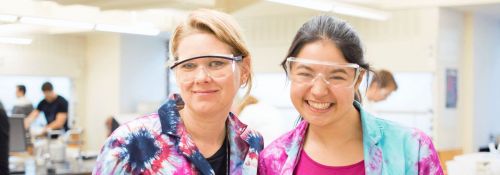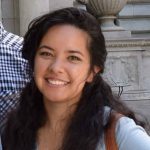
Liberal Arts in the Lab
Written by Giannina Imperial
Sitting in science class and learning about the interactions between molecules, cells, and forces is one thing. Getting your hands gloved up and making these discoveries yourself is a whole different ball game.
This is what many students do here at Hillsdale almost every day. When we aren’t in the classroom, we are in science labs working under our research advisors on scientific studies that help to inform our understanding of the world around us. Research is an integral part of life as a science major here at Hillsdale, and every student majoring in biology, chemistry, physics, and psychology needs to complete some body of research before graduation. Not bad for a small liberal arts college of about fourteen hundred students.
But is scientific research necessary for a liberal arts education? Why should we include into our own curriculum a practice that seems more emphasized at larger research institutions—places that do not embrace the liberal-arts method of education?
Organic chemistry professor Dr. Courtney Meyet says the liberal arts need scientific ethics. The “good” in science is to pursue good and fruitful purposes using the ethical considerations we learn throughout our well-rounded liberal arts experience.
“We want our students to understand the impact that scientific discoveries have on our world,” she says. “Nowadays, our big scientific decisions are made by politicians that do not have scientific backgrounds, and that is what our current education system is giving us. On the flip side, we are also given scientists who are not in tune with the culture, morals and ethics, and what is Good and Right, whereas Hillsdale students have a firm foundation in so many areas that they could be able to make those kinds of informed decisions.”
Research in a liberal arts atmosphere, then, allows students to make those discoveries and to apply them with an ethical and higher understanding of the world that can best serve the needs of the public. Our scientific discoveries are shaped by our well-rounded perspective obtained from our studies, shaping us into wise and honest scientists.
“What is ‘Good,’ ‘Truth,’ and ‘Beauty’ in science?” Dr. Meyet asked. “Ultimately, science has to serve some purpose, and I think for the most part, scientific research follows a pattern of purpose: How can science serve to help our fellow human beings?”
As students, immersing ourselves in our respective fields and making discoveries that could affect the knowledge base of the sciences is a great power. It is an even greater testament to our characters if we use this new knowledge to make the world a better place rather than glorifying our own work. Our liberal arts education helps us to build our ethical power in the sciences in order to pursue the highest goals for our community and our world.
 Giannina Imperial, ’18, is a psychology major and biology minor from Jackson, MI. If she isn’t in the Psychology Suite running research participants or in AJ’s immersed in her biology textbooks, you’ll find her in the music hall for one of the dozen rehearsals she’ll have that day. She loves God, neuroscience, dancing like no one’s watching, getting ice cream with friends, and trying out every Filipino recipe in her mother’s arsenal of cookbooks.
Giannina Imperial, ’18, is a psychology major and biology minor from Jackson, MI. If she isn’t in the Psychology Suite running research participants or in AJ’s immersed in her biology textbooks, you’ll find her in the music hall for one of the dozen rehearsals she’ll have that day. She loves God, neuroscience, dancing like no one’s watching, getting ice cream with friends, and trying out every Filipino recipe in her mother’s arsenal of cookbooks.